Google Analytics 4 Migration Step-by-Step Guide
Migrating your website analytics to Google Analytics 4 (GA4) can unlock powerful new insights into user behavior. But how do you actually move from Universal Analytics without disrupting your tracking? This comprehensive GA4 migration guide provides website owners and analysts a step-by-step process for smooth and seamless tracking.

Introduction to Key Differences Between Universal Analytics and GA4
Before jumping into migration steps, let's overview some critical distinctions between Universal Analytics vs GA4:
Google Analytics 4:
- Event-based model - focuses on granular user actions
- Auto-tracking of interactions like clicks and scrolling
- Cross-device tracking with User ID
Universal Analytics:
- Pageview and session-focused
- Requires manual event configuration
- Limited to session-based data
These differences demonstrate why upgrading to GA4 is worthwhile for unlocking richer insights and improve marketing strategy.
Here's what you can find in GA4 that's carried over from Universal Analytics
- Basic Tracking and Reporting: Just like Universal Analytics, GA4 still tracks and reports on essential metrics such as page views, sessions, and users. These metrics provide fundamental insights into user engagement and traffic patterns on websites and apps.
- Traffic Sources: GA4 continues to show you where your traffic is coming from, including sources like organic search, direct traffic, referrals, and paid campaigns. This helps you understand how users are finding your website.
- Geographic and Demographic Data: You can still access and collect data about the geographic locations of your users. Their demographic information such as age and gender is also collected. This data is valuable for understanding your audience's characteristics.
- User Flow and Behavior Reports: GA4 maintains the ability to visualise user flow through your website. Google Analytics reports provide visualisation to see the paths users take, where they drop off, and how they move from one page to another.
- Goals and Conversions: While the concept of goals has evolved into events in GA4, you can still set up conversions and track them. GA4 provides flexible event tracking that can be used to measure conversions similar to how goals were used in Universal Analytics.
- Custom Dimensions and Metrics: Like Universal Analytics, GA4 allows you to define custom dimensions and metrics. These help you segment and analyse your data in a way that's specific to your business goals.
- Ecommerce Tracking: GA4 maintains the ability to track e-commerce data, such as product views, add-to-carts, and purchases. However, the implementation may be different due to GA4's event-based model.
- User ID and Cross-Device Tracking: GA4 continues to support user ID tracking, which enables cross-device tracking and a more holistic view of user behaviour across sessions and devices.
Step-by-step process of migrating to GA4
Step 1: Review Current Universal Analytics Setup
Carefully examine existing goals, events, custom dimensions, tracking code, and other configurations in Universal Analytics. Document all specifications to inform migration.
- Document current analytics tracking code implementation
- Note down script locations like header or body
- Identify measurement ID being used
- Document any goals configured
- List out all goal names, steps and value settings
- Identify any implemented custom dimensions or metrics
- Catalog parameter names and scope (hit, user, product level)
Step 2: Create New GA4 Property and Enable Auto-Tracking
In the Google Analytics admin:

- Sign in to Google Analytics account
- Click Admin and select your account
- Click "+ Create Property"
- Name new property appropriately
- Select "Website" as data source
- Check box to enable Enhanced Measurement
- Generate a new GA4 measurement ID
- Create Property for "website" and enable Enhanced Measurement for automatic event tracking
This activates automatic event collection - no more coding every scroll, click and tap!
Step 3: Add Updated GA4 Tracking Code
Copy over the new unique GA4 measurement ID by replacing your current Analytics tracking code on every single page of your website templates with the updated script. Add before the </head> tag.

- Copy new GA4 measurement ID
- Replace old ID with new one in tracking code
- Ensure tracking code loads before </head> tag
- Test preview site to confirm new code loads
Step 4: Migrate Custom Events to GA4 Parameters
Check your existing event tracking implementation for things like newsletter signups, downloads, etc. Update the code syntax to match the new Google Analytics 4 parameters and data model while preserving the original event actions.
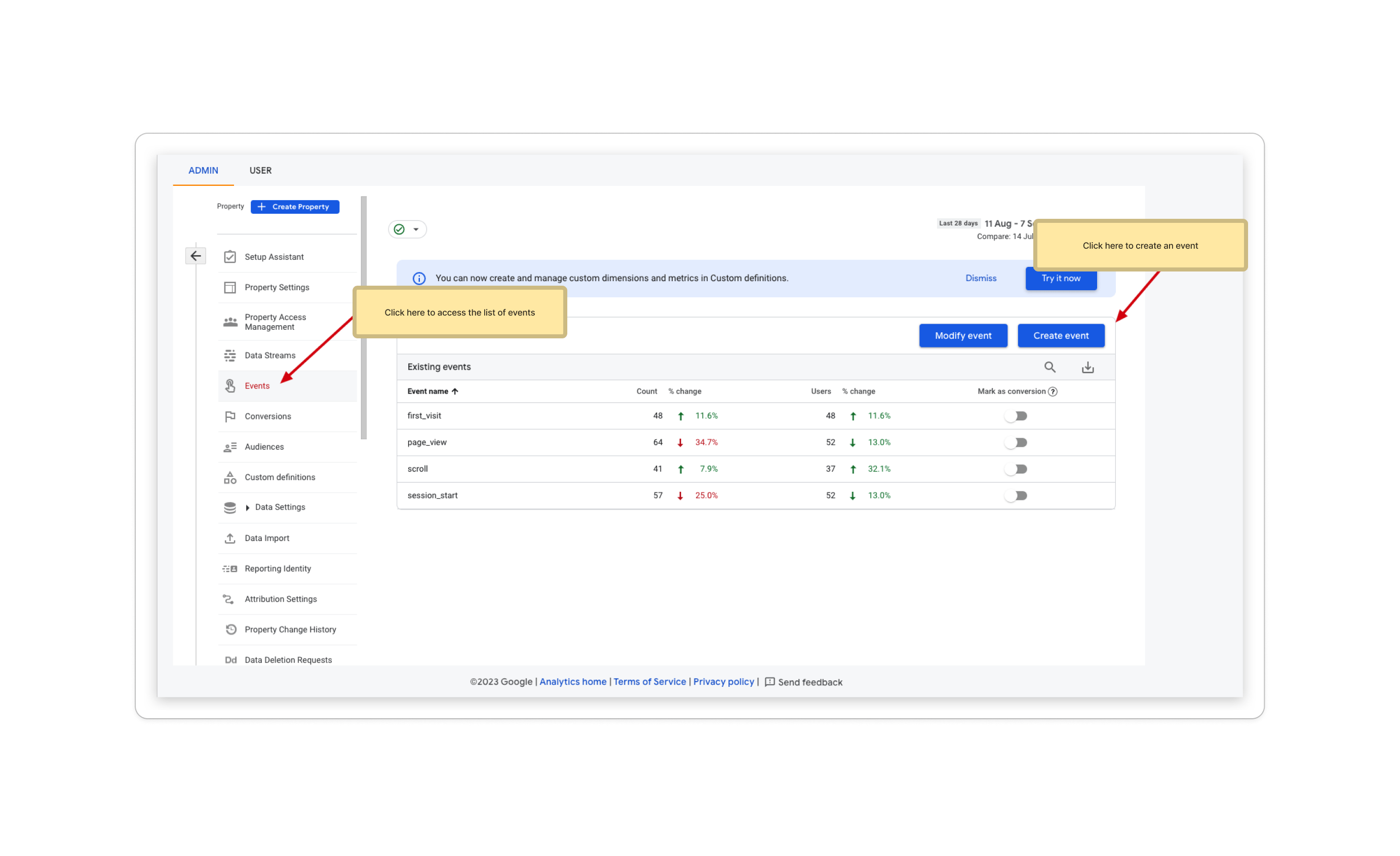
- Review implementations for newsletter signups
- Review implementations for file downloads
- Review implementations for key site interactions
- Update event name parameters to match GA4 syntax
- Preserve original tracked actions/labels
- Test events on preview site to confirm tracking
Step 5: Reconfigure Custom Dimensions & Metrics
Reproduce custom dimensions and metrics from Universal Analytics in GA4 using correct parameters.
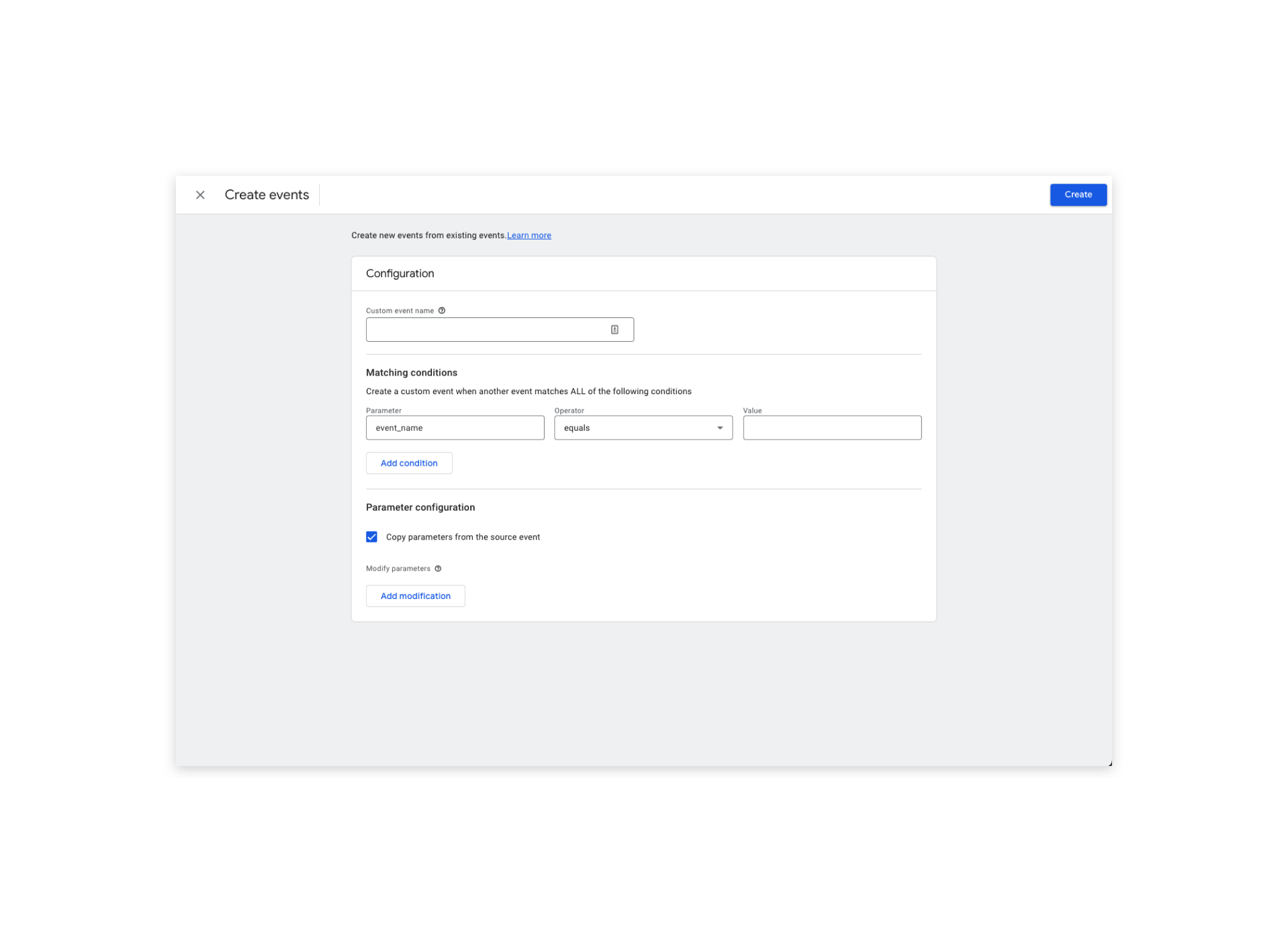
- Access GA4 property parameters
- Recreate each custom dimension needed
- Recreate each custom metric needed
- Use proper GA4 syntax and prefixes
- Map values to parameters (product, user level)
Step 6: Set Up Conversions and Goals as Events
Convert existing goals into appropriate GA4 events using tracking code triggers. Monitor using Realtime reports.

- Document important goals from UA property
- Determine appropriate event triggers for each
- Enable conversion marking for named events
- Test goal completion on preview site
Step 7: Get more out of GA4 with Google Search Console
Linking GA4 and Search Console combines search analytics with behavioural insights for optimisation.
By connecting Google Analytics 4 with Google Search Console, you bridge the gap between how users find your site and how they interact with it. The insights gained enable data-driven decisions that enhance your content, improve user experience, and drive conversions. This integration empowers you to fine-tune your digital strategy for maximum impact.
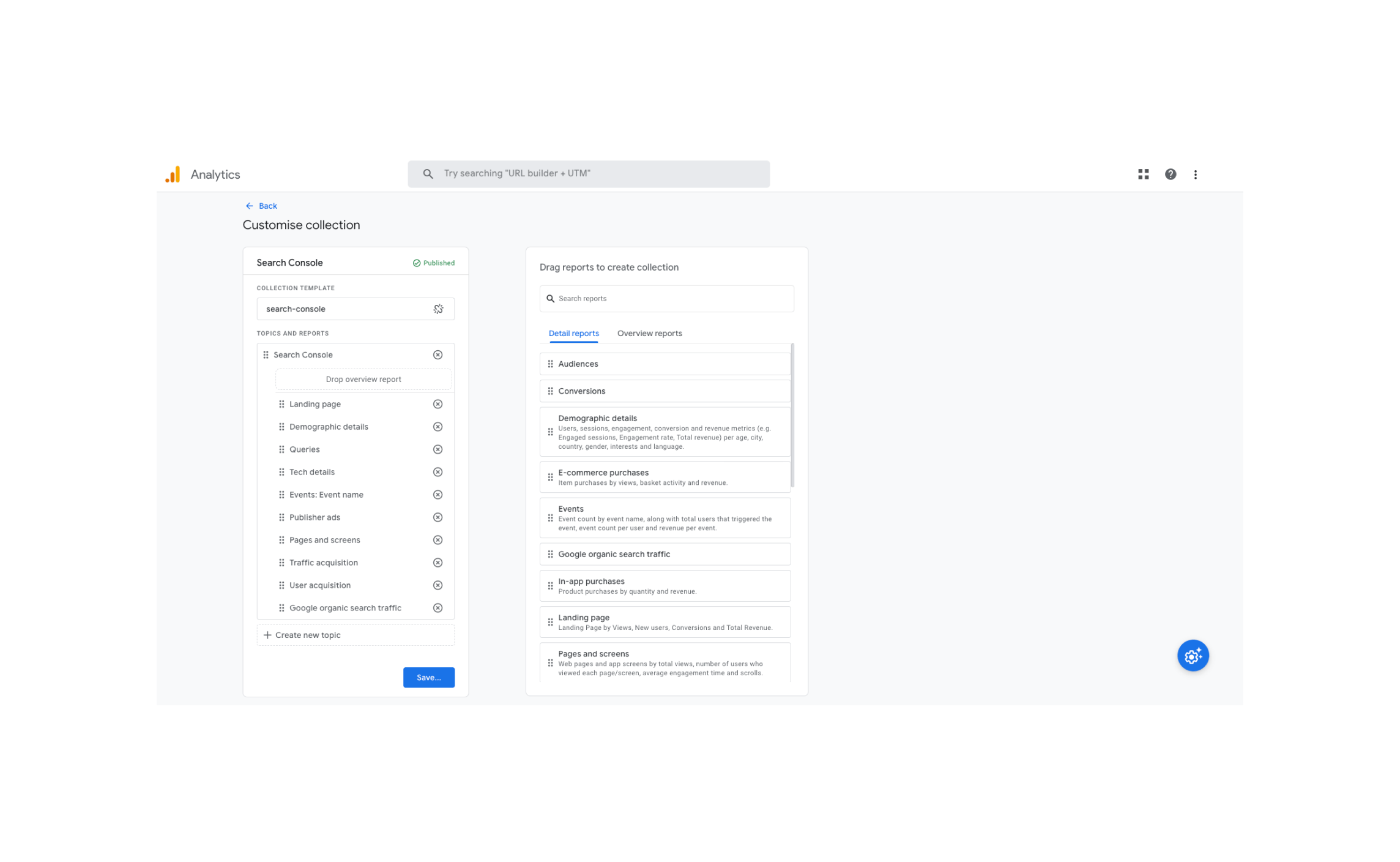
- Unified Data View: By linking GA4 with Search Console, you can see both organic search data and user behaviour on your website in one place. This comprehensive view helps you connect the dots between user engagement and search performance.
- Enhanced Organic Search Insights: Access detailed information about search queries that drive traffic to your site. Understand which keywords users are searching for and how they relate to user behaviour on your site.
- Landing Page Performance: See which landing pages are receiving the most organic search traffic and how users are interacting with them. This insight can guide you in optimising these pages for better user engagement and conversions.
- Click-Through Rate Analysis: Analyse the click-through rates (CTR) for different search queries. If you notice high impressions but low CTR for specific keywords, you can work on improving your page titles and meta descriptions.
- Content Optimization: Identify the most popular landing pages from organic search. Use this data to understand what content attracts users from search engines and tailor your content strategy accordingly.
- User Behaviour Post-Click: GA4 provides insights into user behaviour after they click through search results. You can understand how long they stay, which pages they visit, and whether they convert.
- Conversion Insights: Linking goals or events from GA4 to Search Console data allows you to see which search queries are driving conversions. This insight can help you focus on high-converting keywords.
- User Demographics and Behavior: GA4's enhanced user-centric model paired with Search Console data can give you insights into the demographics and interests of users who are finding your site through search.
- Identify Opportunities: Discover search queries that are generating high impressions but relatively low clicks. This could highlight opportunities to improve your content and meta descriptions to attract more clicks.
Step 8: Update your reporting and analysis
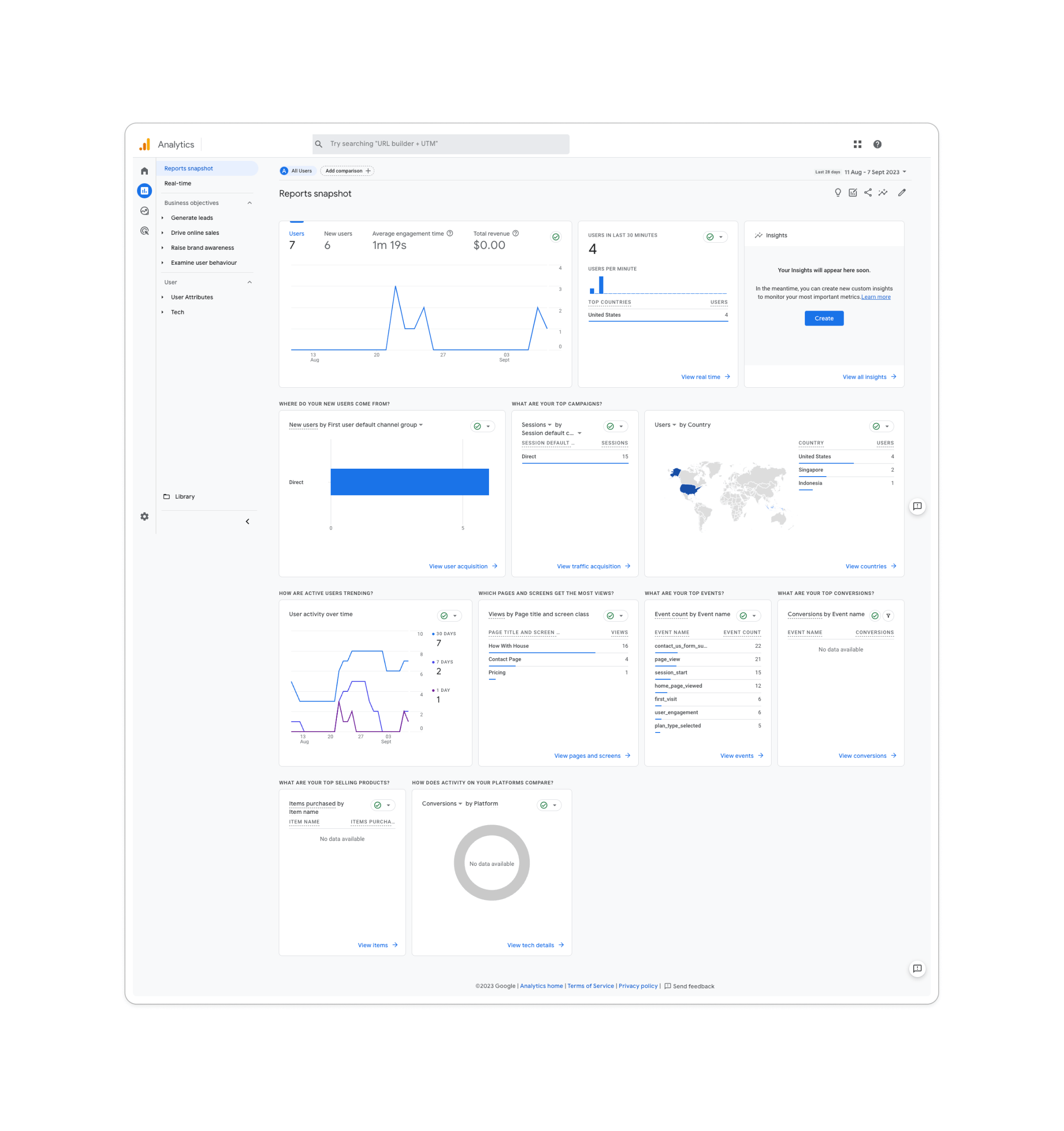
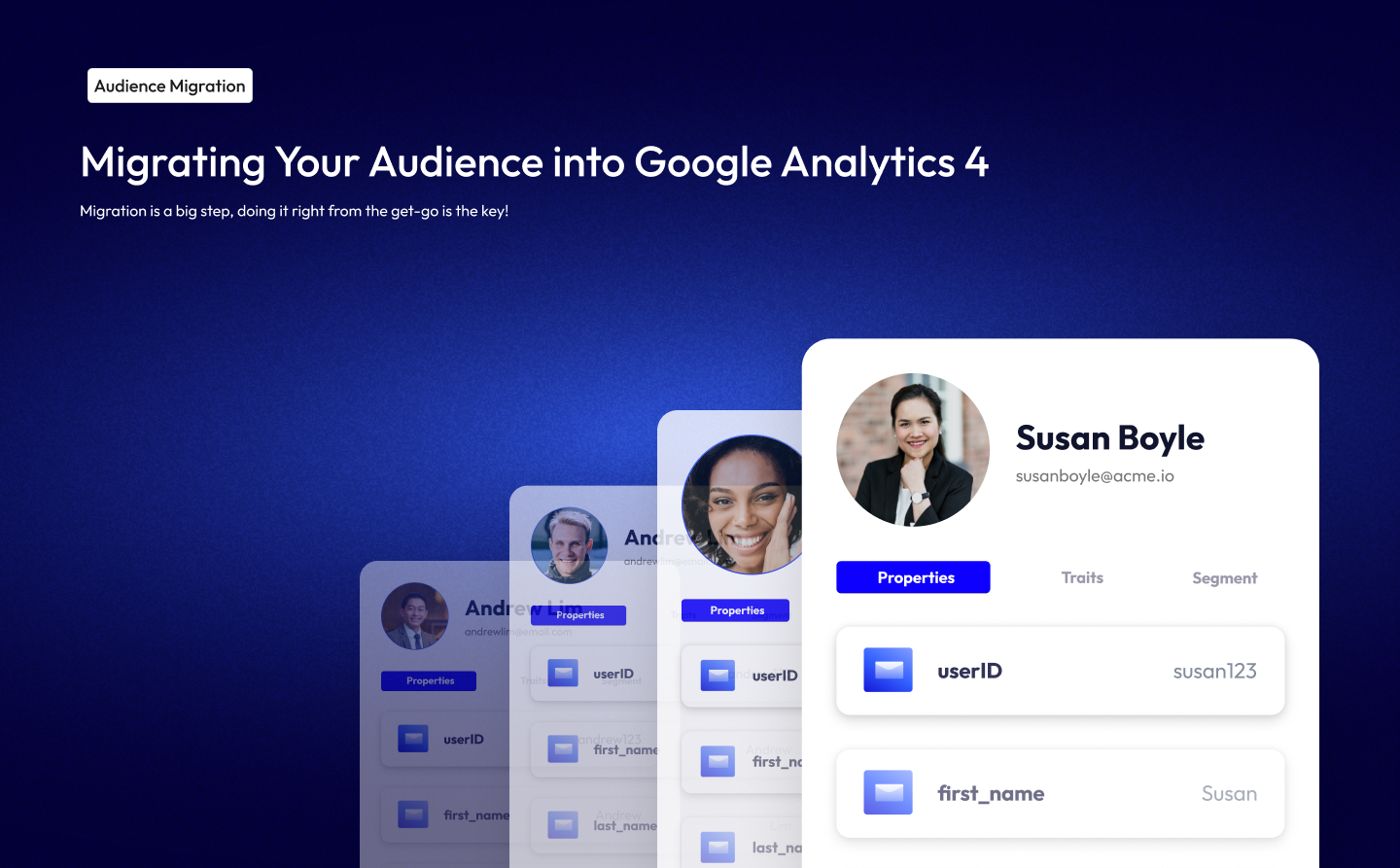
Google Analytics 4 Audiences Migration Guide
When transitioning your audience from the Universal Analytics property to the Google Analytics 4 property, you can pinpoint identical user groups using your Google Analytics 4 data. Subsequently, you can export these audiences to your linked Google Ads accounts to cater to similar scenarios.
Step 1: Import UA Users into Sheet
- Open your Google Sheet and activate the GA4 Migrator add-on
- Select your Universal Analytics Account from the dropdown
- Choose the UA Property to pull users from
- Click "Import Users from Analytics"
- Wait for import to fully complete
Step 2: Consolidate Roles for Each User
- Review permissions for each imported UA user
- If multiple roles are checked, select the highest role needed
- Alternatively, remove less critical role access to generalize
- Ensure only one role remains checked per user
Step 3: Select Target GA4 Property
- Choose your Google Analytics 4 Property from the dropdown
- Double check it's the correct property to migrate users into
Step 4: Export Users to GA4
- Once all users show just one role each, click "Migrate"
- Confirm you want to apply configured user permissions
- Wait for export process to fully complete
Step 5: Validate in GA4
- Go to the GA4 Property Users page
- Verify imported users and assigned roles
- Check user group memberships if applicable
Troubleshooting:
- If errors, confirm UA and GA4 role selections
- Try exporting a partial list of users
- Leverage GA4 user management tools for additional changes
The best bet is to get an expert on board!
Don't worry anymore! Let the experts at Devhaus setup Google Analytics 4 and migration seamlessly. Our engineers in Devhaus are GA4 certified and we've done it for all business types.
Devhaus is a digital transformation agency that helps our customers stay center stage in their markets with the latest technology trends. Our team combines years of expertise, industry-leading applied technologies, and a crystal clear vision of where we are headed tomorrow. No matter what challenge your organization faces, we have the right solution — today.
Growth Strategy Services
A successful go-to-market strategy is essential for any business looking to maximize their revenue.
If this resonates with you, let's work together:
- You need better digital marketing performance
- You need a strategy for your growth stack
- You need an outbound marketing strategy to reach your target audience accurately
Webflow Strategy & Development
Create dynamic experiences that help deliver memorable content, while still maintaining security and privacy.
If this resonates with you, let's work together:
- You need to do design and develop a content management system that is tailored to your business needs.
- You need a team at bay to continuously design and develop new pages on your website.
- You need a design team to create unique experiences for your users that includes wireframing and developing it.
Architecture Strategy & System Integration
Innovative solutions tailored to each of customer's unique needs will be dedicated to help your customers reach their goals.
If this resonates with you, let's work together:
- You need a new pair of eyes to assess and audit the existing systems in your business and revamp where needed to meet today's business needs.
- You need architecture strategy to develop a clear plan for data collection and event tracking plan for a better visuals of key insights on your customers.
- You need to integrate multiple software tool to automate business processes and maintaining the efficiency of the system regularly.

Up to 50% Subsidisies on your next implementation strategy with us
For Companies registered and operating in Singapore, with up at least 30% local shareholding - leverage on the Enterprise Development (EDG) grants for your next; Strategy, Implementation or Enablement project with us at Devhaus!
Supporting Asia’s teams - from all shapes and size












Frequently Asked Questions
Here are some pointers, and a little - 'Quick bite-sized information'.
A: The choice depends on your current stage and specific needs:Alpha ($15K) - If you need to validate a new idea, conduct market research, or develop a go-to-market strategy before building anything
Beta ($25K+) - If you're ready to build an MVP, new website, or CMS with user-focused design and basic analytics
Gamma ($50K+) - If you have an existing system that needs growth acceleration, marketing automation, or enhanced analytics
Delta ($200K+) - If you're undertaking comprehensive digital transformation with legacy system modernization
Epsilon ($30K+) - If you have existing systems (preferably built by us) that need performance optimization and technical debt reductionNot sure? Book a free 30-minute consultation with Rohan (rohan@admiralsystems.io) to discuss your specific situation and get a tailored recommendation.
Our pricing is completely transparent with fixed-scope packages:
What's Included:
- Dedicated team of 3-5 specialists per engagement
- All deliverables listed in the engagement model
- Comprehensive enablement documentation
- Project management and regular progress reports
- Up to the maximum man-hours specified (200-1,200 hours depending on engagement)
No Hidden Costs Policy:As long as your project stays within the agreed scope and timeline, there are no additional charges
- All potential add-ons are clearly listed upfront with fixed pricing
- For Singapore companies: EDG grants can cover 50-70% of costs (we handle the entire grant process)
When Additional Costs Apply:
- Scope changes beyond the original engagement (requires new engagement purchase)
- Client-caused delays that exceed allocated man-hours
- Optional add-ons you specifically request
Each engagement has a defined maximum timeline:
- Alpha: 2-8 weeks (200 hours)
- Beta: 8-12 weeks (280-500 hours)
- Gamma: 16-20 weeks (700 hours)
- Delta: 26-52 weeks (1,200 hours)
- Epsilon: 6-10 weeks (300 hours)
- Project Delays: We build buffer time into our estimates to account for normal client feedback cycles
( If delays are caused by our team, we absorb the additional costsIf delays are client-caused and exceed our allocated man-hours, additional charges may apply at our standard hourly ratesWe provide weekly progress reports so you always know where we stand)
- Acceleration Options: Rush delivery available with 50% surcharge for urgent needs
We can often compress timelines by adding additional team members! If you have your own development team, we're more than happy to take it up to hi-fi prototyping so it'll be a ton less work for your Dev team!
We can only guide you through it - having said that, we're experienced grant partners and handle the entire process:
Grant Coverage:
- Singapore SMEs: Up to 50% of project costs covered
- Sustainability projects: Up to 70% coverage (until March 2026)
- Our services align with multiple EDG categories: Business Strategy Development, Financial Management, Human Capital Development, and Strategic Brand & Marketing Development
Our Grant Process:
Partner Network: We work with Real Inbound Consulting (certified TR 43/SS 680) for grant administration
Full Service: Application preparation, document submission, project management, audit support, and claims processing
Administration Fees: $7,800-$15,000 depending on project size (much less than the grant savings)
Success Rate: High approval rate based on our experience with 50+ grant applications
Eligibility Requirements:
- Singapore-registered company30%+ local equity held by citizens/PRs
- Financially stable to complete the project
- Project hasn't commenced before application
Timeline: Grant approval typically takes 4-6 weeks before project commencement.
We offer multiple post-engagement options:
Immediate Post-Completion:
- 30-day warranty period for any bugs or issues
- Complete handover documentation and training
- Knowledge transfer to your internal team
Ongoing Support Plans:
Starting from
Basic ($5K/year): 40 hours, bi-annual check-ins, basic troubleshooting
Advanced ($10K/year): 80 hours, quarterly check-ins, strategy sessions
Premium ($20K/year): 120 hours, monthly check-ins, dedicated account manager
Growth & Evolution:New Requirements: Purchase additional engagement models for new projects
System Expansion: Beta → Gamma → Delta progression path available
Continuous Optimization: Epsilon engagements for ongoing performance improvements
Key Principle: Support covers maintenance and optimization of existing systems, but new features or integrations require new engagement models to ensure proper scoping and quality.
Key differentiators set us apart:
1. Asian Market Expertise:
- First Webflow Enterprise partner in Asia
- Deep understanding of Singapore, Hong Kong, and Indonesian markets
- Multi-language, multi-currency, cross-border commerce experience
2. Comprehensive MarTech Integration:
- Partners with 15+ best-in-class platforms (Segment, Customer.io, Fullstory, etc.)
- End-to-end data pipeline orchestration (not just point solutions)
- Unified dashboard approach preventing "tool sprawl"
3. Award-Winning Creative + Technical Team:
- 2024 Fullstory Service Partner Award winner (APAC)
- Design team that creates "jaw-dropping creatives" alongside technical implementation for your analytics
- Creative-technical convergence in every project


